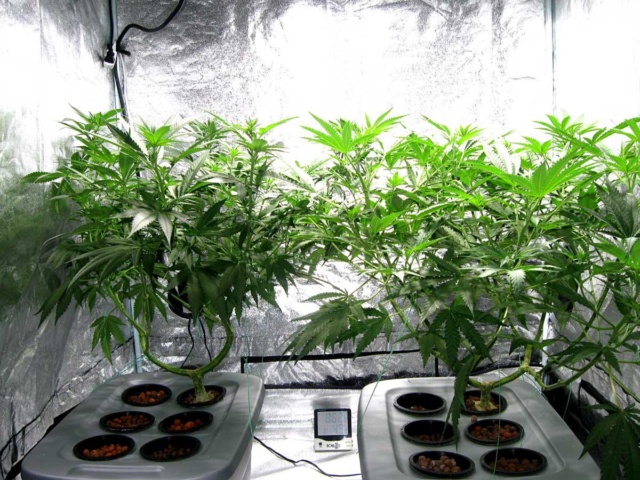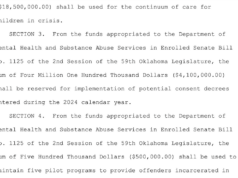
Merry Spliffmas and Happy Chronukah, y’all!
Each year, April 20 stands as a sort of marijuana-appreciation day, mainly because the numerical date of 4-20 corresponds to a widely used weed-smoking euphemism with murky origins.
Provenance aside, the politics surrounding marijuana and its various uses have shifted the issue of legalization from the fringe advocacy of bearded Grateful Dead fans to one of mainstream political discourse.
Indeed, as states loosen pot restrictions to either allow full-blown recreational use or merely access to medical marijuana, the medical, economic and social benefits of decriminalization grow more apparent.
Medical marijuana is a health care issue
On Monday, Oklahoma Gov. Mary Fallin signed HB 1559 into law. Effective Nov. 1, licensed health care practitioners ranging from veterinarians to podiatrists will be able to administer cannabidiol (CBD) treatments legally in the state as long as such treatments have received federal Food and Drug Administration approval. It also allows industrial hemp to be shipped into Oklahoma (but not grown here).
Common maladies that benefit from CBD treatments, as cited in the bill, include epileptic conditions, multiple sclerosis, nausea and vomiting, and appetite stimulation to combat chronic-wasting diseases, among others.
The governor’s approval of HB 1559, which passed 80-7 in the House and 44-0 in the Senate, continues a push for the relaxation of laws restricting the use of CBD oil.
In 2015, Fallin signed what became known as Katie’s Law, which allowed children under 18 years to receive CBD treatments as part of clinical trials. In 2016, Rep. Jon Echols (R-OKC), who also authored HB 1559 along with Sen. Ervin Yen (R-OKC and a cardiac anesthesiologist), pushed a bill to remove those age restrictions and expand CBD test treatments to adults.
Legalizing weed is an economic issue
Seven states and the District of Columbia have full legalization for recreational and medical marijuana use, while 20 more have acquiesced only to medicinal use (see map here). In 2015, both channels of use constituted a $5.4 billion industry.
States are seeing the financial benefit, according to the video above from The Washington Post. In 2016, Washington is forecast to rake in $270 million in overall marijuana-related tax revenue. Colorado will gross a projected $140 million the same year, while Oregon is on track to collect $10.75 million. All three states have recreational and medicinal legalization.
On the flipside, Oklahoma and its square cohorts miss out on a collective $28 billion annually, according to the Tax Foundation.
Decriminalization is a social issue
Last year’s passage of SQs 780 and 781 illustrates that the Sooner State gets it when it comes to low-level drug offenses like simple marijuana possession and how those people need help, not punishment.
Despite a now-shamed former senator’s attempted derailment of SQs 780 and 781, criminal justice reform represents one of Fallin’s most successful legislative initiatives this session. Seeking alternatives to prison for nonviolent drug offenders helps keep families together, offers treatment for addicts with mental health and other issues, and lessens the burden of an already overcrowded prison system.
Successful reforms in other states bear out the benefits of legalization. From 2008 to 2014, marijuana arrest rates fell 90 percent in Washington and 60 percent in Colorado, according to the Center on Juvenile and Criminal Justice. This alleviates a significant burden on those states’ criminal justice systems, in turn reducing the financial burden of the taxpayer.
But won’t someone please think of the children?!
Luckily for you, shrill detractor, someone has: Following Colorado’s legalization, teens in in that state didn’t rush out to get Rocky Mountain high. Rather, use among teens remained steady, according to the Colorado Department of Public Health, indicating that legality has little to do with even a teenager’s choice to smoke out.
In fact, the results of a Yahoo! News/Marist poll released Monday indicate illegality factored into abstinence for only 27 percent of non-using survey respondents. Personal aversion, at 26 percent of non-users’ responses, represents a relatively equal bow out. (WaPo does a fine job of visualizing the poll data here.)
Uncertainties grow under Trump administration
Oklahoma advocates have been struggling to get the issue of medical marijuana in front of voters during the past few years. One of the most prominent groups, Oklahomans for Health, ran campaigns for ballot initiatives in 2014 and 2016 that would have allowed Oklahoma’s voters to decide the legality of medical marijuana.
The first petition failed to garner enough signatures to appear on the ballot that year, but the second could be poised for success after Oklahomans for Health submitted a successful number of signatures. Then-Attorney General Scott Pruitt re-wrote the ballot title so that the language appeared to imply “yes” votes would support full legalization, not just medicinal use, but the Oklahoma chapter of ACLU challenged Pruitt’s rewrite of SQ 788, and the Oklahoma Supreme Court threw out the rewrite in March.
Still, voters will have to wait until 2018 before finally being allowed to weigh in on SQ 788.
At the federal level, meanwhile, one of President Donald Trump’s appointees in particular seems poised only to make states’ decisions regarding legalization harder. An analysis from the L.A. Times’ Kurtis Lee notes that while a President Barack Obama-era provision protecting medicinal marijuana remains in place nationally, recently appointed U.S. Attorney General Jeff Sessions is “not a fan” of recreational provisions, states’ rights be damned. Trump, for his part, had said during his campaign that he believed the issue to be up to states to decide.
420 rally rescheduled at State Capitol
Oklahomans for Health recently applied and received approval for permission to hold a pro-SQ 788 rally today at the State Capitol. Supporters were disappointed, however, when that event was cancelled earlier this week. Online commenters noted apparent scheduling conflicts with another approved event: current gubernatorial candidate and former state Sen. Connie Johnson’s Rally for Justice. (Ironically, Johnson herself has made the legalization of medical marijuana a prioritized issue in her political career since 2007.)
According to discussion on the Oklahomans for Health Facebook page, their rally specifically promoting SQ 788 has been rescheduled. It will take place from noon 7 p.m. Saturday, April 29, on the Capitol’s South Plaza.
Given the rescheduling, Oklahomans for Health encourage interested parties to attend the Pontotoc County Drug Free Coalition’s A Conversation with Professionals event from 6 p.m. to 8 p.m. tonight in Ada, Oklahoma. That panel discussion will center on the issues surrounding and consequences of legalizing medical marijuana.





















